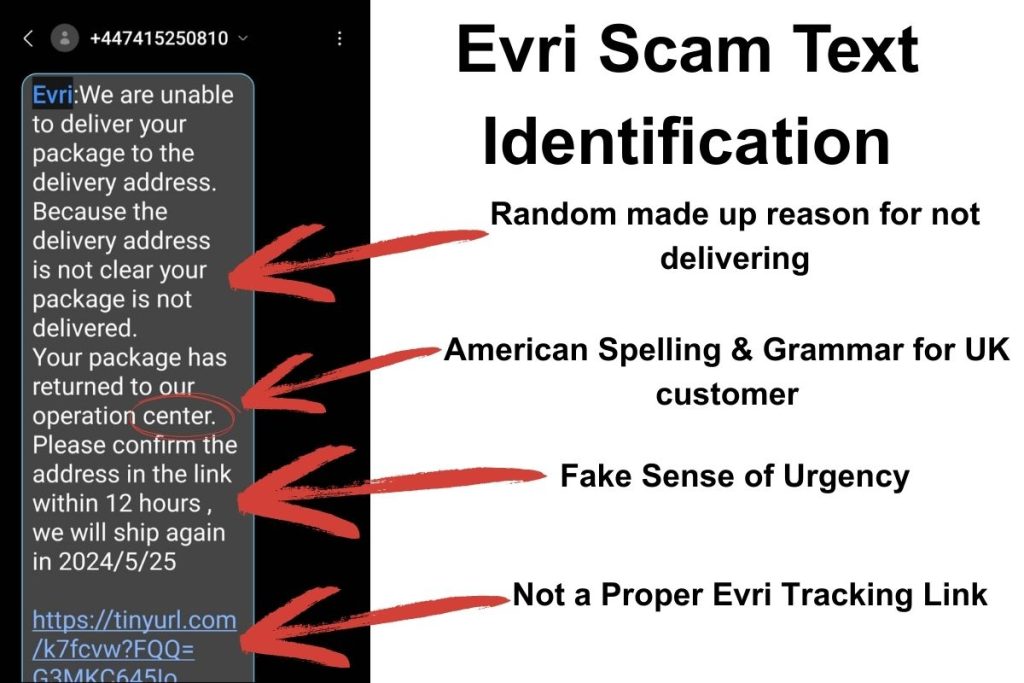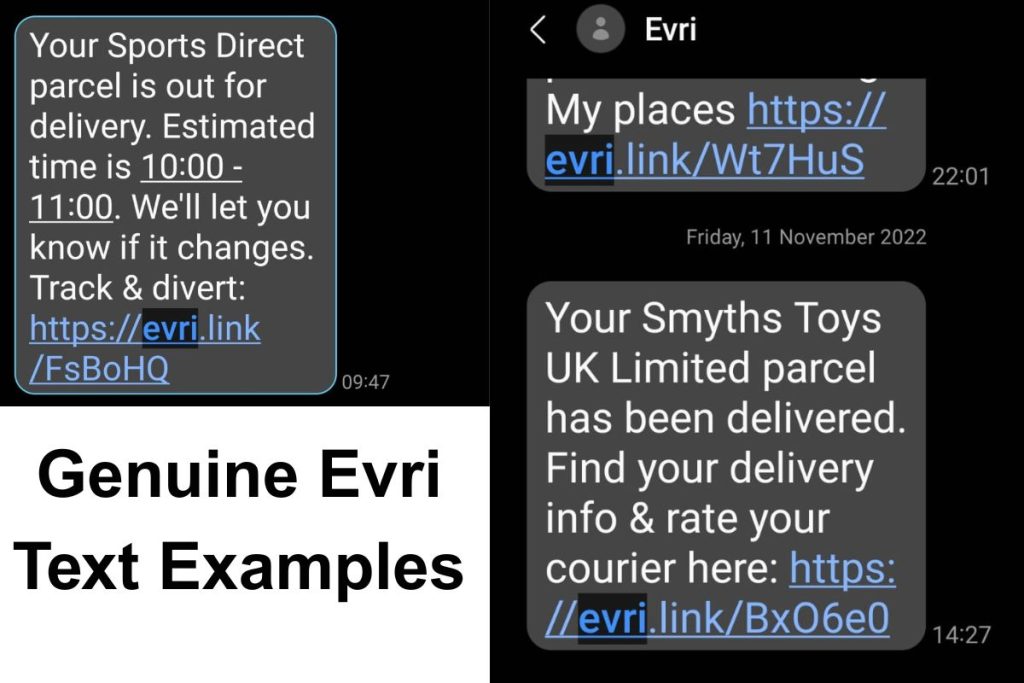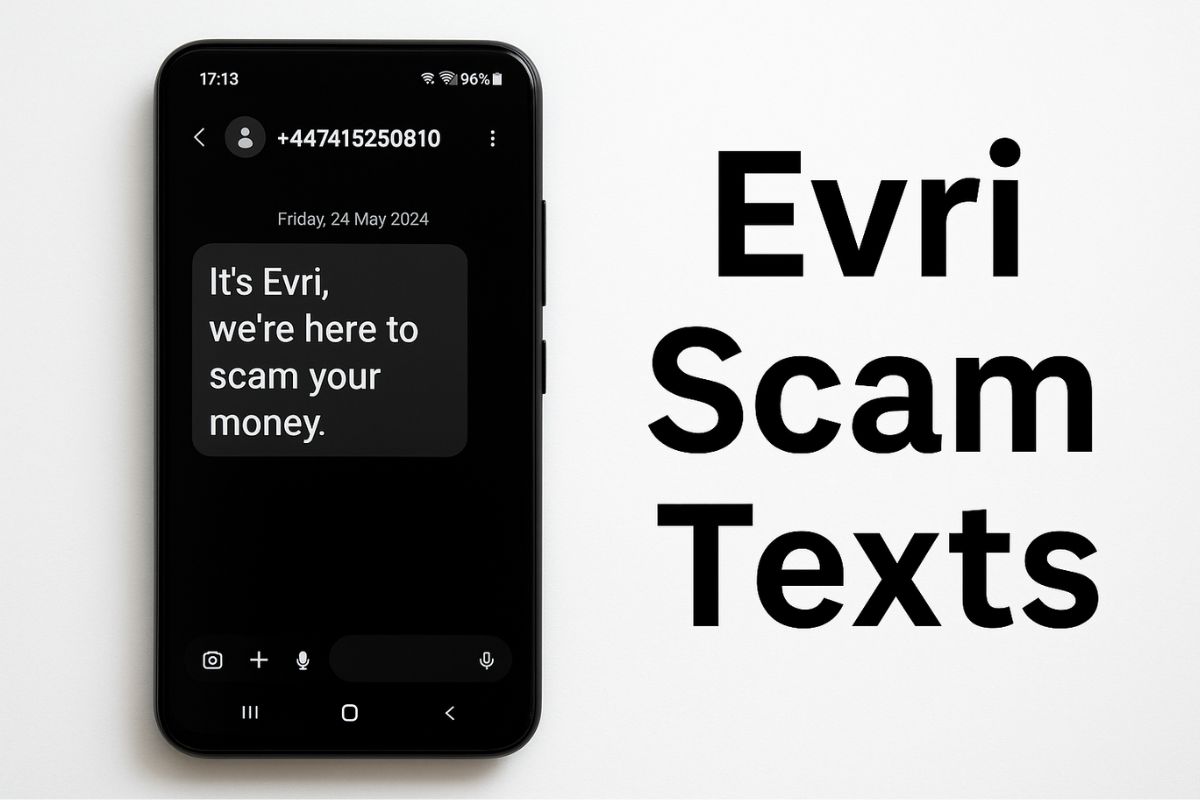You’ve just received a text message claiming to be from Evri about a parcel delivery issue or an unexpected fee.
Before you click on that suspicious link or hand over your card details, it’s worth taking a moment to make sure you’re not about to fall victim to one of the increasingly sophisticated Evri scam text messages doing the rounds.
With parcel delivery scams becoming the fastest-growing type of fraud in the UK, and Evri being one of the most commonly impersonated courier services, knowing how to spot these dodgy texts could save you from a serious headache (and a potentially emptied bank account).
Evri Scam Text Messages: The Rising Tide of Delivery Fraud
Let’s face it – scammers love to impersonate delivery companies, and Evri (formerly Hermes) has become a prime target.
In fact, in October 2024, Evri noted a whopping 4x rise in scamming incidents and took down an eye-watering 12,000 fake websites associated with these scams.
The reason these scams are so effective is simple: we’re all ordering online more than ever, and keeping track of multiple deliveries can be confusing.
When you’re expecting several parcels from different retailers, a text about a “delivery issue” doesn’t immediately ring alarm bells – and that’s exactly what the fraudsters are counting on.
How to Spot a Fake Evri Text Message
So how do you tell the difference between a genuine communication from Evri and someone trying to nick your bank details?
Here are the telltale signs to watch out for:
1. Sender ID Red Flags
Legitimate Evri text messages will always appear with “Evri” as the sender, never from a mobile phone number.
If you’ve received a text from a regular mobile number claiming to be Evri, it’s almost certainly a scam.
2. Payment Requests
This is a big one. Genuine Evri text messages will never ask you for payment. Not for redelivery, not for “customs charges,” not for anything.
If a text is asking you to pay a fee to release your parcel, it’s a scam, plain and simple.
3. Suspicious Links
Real Evri tracking links will only ever direct you to the official Evri website, typically starting with “https://evri.link/“.
Scammers often use URLs that look similar but have slight misspellings or unusual formatting. Always check where a link is going before clicking on it.
4. Urgency and Pressure Tactics
Scammers love to create a false sense of urgency.
Messages claiming your parcel will be “returned to sender in 24 hours” unless you take immediate action are designed to make you panic and act without thinking.
Genuine Evri messages are informative, not threatening.
5. Poor Grammar and Spelling
While the occasional typo can slip through anywhere, scam messages often contain multiple spelling errors, weird formatting, or awkward phrasing like “in the process of transportation” instead of “in transit” or “is missed delivery” rather than “missed delivery.”

What Do Genuine Evri Text Messages Look Like?
Authentic Evri text messages are typically straightforward and informative. They’ll usually:
- Come from “Evri” as the sender (not a mobile number)
- Provide tracking information without asking you to click links (though sometimes they do include a legitimate tracking link to evri.link)
- Never ask for payment or personal information via text
- Inform you about delivery status or delivery window information
- Be specific about your delivery rather than vague
If your delivery status shows “We’re Expecting It” or “On its Way”, checking the official Evri app or website directly (by typing the URL yourself, not clicking links) is the safest way to verify status updates.

Common Types of Evri Text Scams
Scammers aren’t particularly creative, so their messages tend to follow familiar patterns:
The “Delivery Fee” Scam
This is where you receive a text claiming your parcel can’t be delivered until you pay a small fee (usually under £5).
The amount is deliberately low to seem plausible and not raise immediate suspicions.
Remember that Evri’s delivery practices never involve requesting payment via text after a delivery is already in process.
The “Redelivery” Scam
You’ll get a message claiming Evri tried to deliver your parcel but you weren’t in, and you need to reschedule by clicking a link and providing information.
While Evri does occasionally need to redeliver parcels (especially on Sundays when deliveries are rare), they’d never ask you to reschedule through a text message link.
The “Problem with Delivery” Scam
This vague message suggests there’s an issue with your delivery address that needs urgent attention. The scammer hopes you’ll panic and click their link without thinking twice.
What to Do If You Receive a Suspicious Evri Text
If you’ve received a text message claiming to be from Evri and you’re not sure if it’s legitimate:
- Don’t click any links in the message
- Don’t reply to the message
- Check your delivery status by going directly to the official Evri app or website (type the URL yourself)
- Forward the suspicious text to 7726 (spells “SPAM” on your keypad) – this reports it to your network provider
- Report it to Evri by taking a screenshot and sending it to phishing@evri.com
Remember that while Evri may have its service issues, they take fraud seriously and want to know about scams using their brand.
What If You’ve Already Clicked a Link or Provided Information?
If you’ve already interacted with a suspicious text:
- Contact your bank immediately if you’ve provided financial details
- Change your passwords for any accounts you may have logged into
- Monitor your bank statements for unusual transactions
- Report the scam to Action Fraud via their website or by calling 0300 123 2040
- Consider running a malware scan on your device
The Bottom Line: Stay Alert, Stay Safe
The reality is that scammers are getting more sophisticated by the day, but armed with the right knowledge, you can spot their tricks a mile off.
Remember that Evri will never ask for payment via text, won’t send links (except tracking links to evri.link), and will always show as “Evri” in your messages, not a random mobile number.
When in doubt, go directly to the Evri website or app by typing the address yourself rather than clicking links.
And if something feels off about a message – trust your instincts. It’s better to be overly cautious than to hand your personal information to a fraudster.
By staying vigilant, you can ensure the only thing getting delivered is your actual parcel – not a nasty scam.




